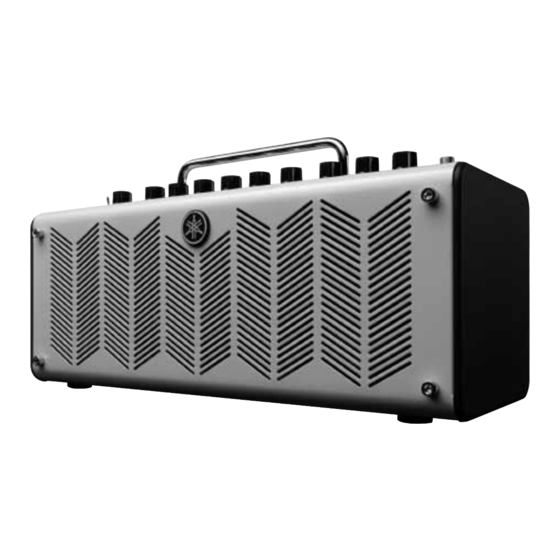Yamaha THR10C Manual - Halaman 3
Jelajahi secara online atau unduh pdf Manual untuk Penguat Yamaha THR10C. Yamaha THR10C 14 halaman. Thr series
Juga untuk Yamaha THR10C: Panduan Pemilik (23 halaman), Panduan Pemilik (22 halaman), Panduan Pemilik (20 halaman), Panduan Pemilik (20 halaman)

THR100H Dual/THR100H Features
3
THR100H Dual/THR100H Features
THR100H Dual/THR100H
Features
That sound
A great amp always has a certain something. More than just great tone, it has dynamics that breathe life into every note
and give punch to every chord. With THR amp heads, Yamaha's engineers have captured the component-level interaction
between the speakers and the power amp (the murky world known as the damping factor) and tuned it to perfection,
achieving a new level of performance excellence, even at low volumes. Don't worry about hearing the difference— you'll
feel it as soon as you plug in and play.
Five amps at the flick of a switch
Whether you use pedals for your overdrive or just crank up
your volume control, one great amp sound is where it all
starts. Sometimes though, you want to take your sound in
a new direction with something just a little different. THR
amp heads feature a single-channel design with five dis-
tinct custom amp types from solid state through to modified
high-gain, all tuned to sound amazing whether you want to
get your drive from a pedal or your amp.
The tubes they are a-changin'
The choice of power tubes in any amp can make a vital dif-
ference. From the warm, soft, rich harmonics of a 6V6 to
the pronounced midrange and tight low-end of an EL34,
changing your tubes changes your amp. However, this
can be difficult; selecting the right tubes, swapping them
out and re-biasing your amp takes a lot of time and mon-
ey, and it's easy to get wrong if you're not entirely sure of
what you're doing. THR amp heads feature new VCM sim-
ulation that allows you to pick from five classic tube types
for any amp model with nothing more than the flick of a
switch on the rear panel. You can even choose from the
smooth compression, soft touch and old-school distortion
of class A, or the tight bass response, greater headroom
and increased dynamics of class A/B for each tube type.
4
